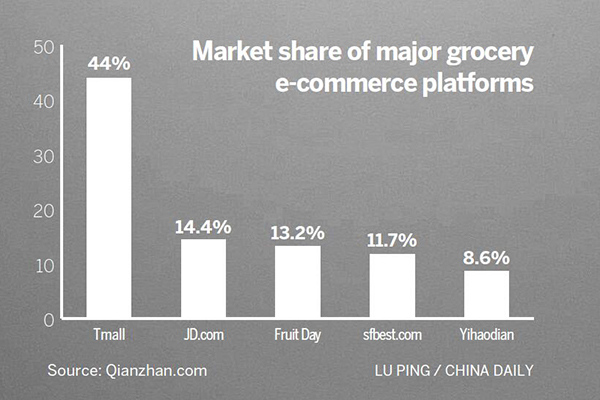
It also did not help that competition in this particular e-commerce segment was stiff. Data from Forward (Qianzhan) Intelligence Co Ltd shows that China's fresh grocery e-commerce market expanded from 1 billion yuan in 2011 to 56 billion yuan in 2015. The consultancy also projects the market size to reach 128.3 billion yuan by 2018.
This promising outlook naturally lured several major players to vie for a slice of the pie. Among them were Chinese e-commerce giants Alibaba, Yihaodian, and JD.com.
To exacerbate matters, buying fresh products online is more expensive than doing so at a physical store. Consulting firm Analysys.cn revealed that the average cost for fresh produce sold online in China is twice that of other products because they are expensive to store and transport.
Li said that most e-commerce sites for fresh produce in China are still struggling to make ends meet, and that having adequate financing is key to survival.
Coincidentally, British online fashion and beauty retailer ASOS also met its Waterloo in China on April 7, announcing that it would discontinue local operations (asos.cn). ASOS CEO Nick Beighton also said that the company will continue to do business in China via its main website (asos.com) and that the decision was made to "serve our growing customer base in China in a more efficient and less costly manner".
Despite the growth in online apparel sales in China-according to a report by the China National Textile and Apparel Council, 723.2 billion yuan worth of apparel was traded online in 2015, a 20.57 percent growth from the previous year-ASOS posted a total loss of 8.6 million euros ($9.8 million) since entering the Chinese market in 2013. In contrast, the brand boasts an average growth rate of 20 percent in the international market.
Li said that the poor performance of ASOS is caused by its unsuccessful marketing in China by failing to reach its target consumers.
Cavender believes that more players will exit the highly competitive e-commerce scene in China unless they can effectively differentiate themselves from competitors.
"While e-commerce is growing quickly, it is a very competitive market with a lot of online stores fighting for customers. Because they have to offer both a high level of service and competitive prices in order to attract customers, margins are very thin," said Cavender.
"Companies need to be responsive to consumer needs, both in terms of brands and products offered, and in terms of service quality. If a site has the same products as everyone else and cannot deliver faster or offer something different, consumers will just choose the cheaper, more established option."


















































